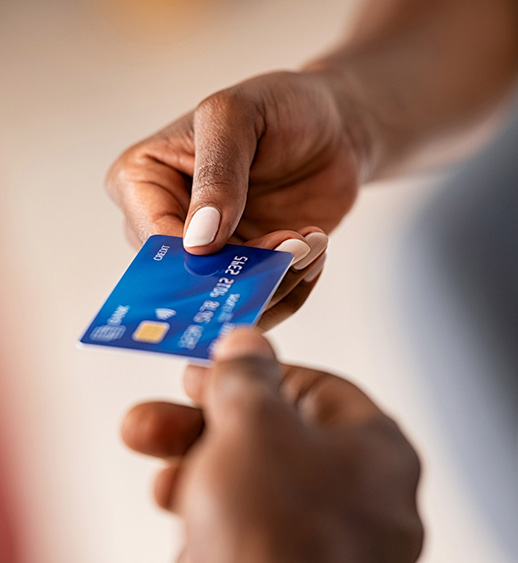Manage and Monitor Your Credit
Your credit score and credit history affect your ability to borrow money for large purchases, like cars or houses. Credit is one of the main factors lenders consider when determining the type of loan to offer and the terms of that loan.
Usually, the better your credit is, the more favorable your loan terms will be. If your credit score is low, you could still be approved for a loan or mortgage, but you may have to pay a higher interest rate.
Credit takes time to build, so it’s important to think about it even if you’re not about to make a large purchase — and especially if you’re planning to buy a home in the future. You can start improving your credit now and make a plan to manage it going forward.

Budgeting and managing debt
Budgeting within your means
To help build and maintain good credit, start by setting up a budget. Determine how much you make and how much you currently spend. Track your spending using a budget tracker to see where you may be able to cut back. Try to avoid unnecessary spending and focus on paying off debts.
Good credit doesn’t happen overnight, so set smaller goals and take it one step at a time as you work toward your larger goals — like purchasing a new home or refinancing your current one.
Managing your debt
To help manage your debt, you first need to figure out exactly how much you owe. Then set up a plan to pay off existing debts and try to avoid taking on new ones. There are free online resources to help you create a payoff plan, like the reducing debt worksheet from the Consumer Financial Protection Bureau.
Credit tip
Making a large purchase on credit or opening a new credit card can impact your debt-to-income (DTI) ratio and credit score, so try to avoid doing so for at least six months before applying for a new loan or mortgage.
Improving and rebuilding your credit
Boosting your score
Increasing your credit score can improve your odds of being offered more favorable terms on your mortgage, auto loan, or other credit application. There are several ways to give your score a boost.
- Keep your credit card balance low. Whenever possible, avoid “maxing out” your cards and try to use no more than 30% of your available credit line, also known as your credit utilization.
- Pay your bills on time. Your score builds over time and paying your bills on time keeps the score moving in the right direction.
- Don’t open too many new accounts. Too many open accounts can hurt your credit, so make sure you understand the effects before applying for or accepting new credit card offers.
- Avoid canceling or closing your existing credit cards. Closing a current account can lower your available credit, increase your credit utilization ratio, and reduce the time span of your credit history — all of these things can hurt your credit score.
- Keep your credit cards active. While credit cards don’t require you to carry a balance, if a card is not used for an extended period, the company may automatically close the account. To prevent this — and the negative effects it can have on your credit — regularly use each card to keep it active, and then pay off the balance as soon as you can.
- Work with a credit counselor. Find an expert to help you navigate your financial journey.
Rebuilding your credit
If you have experienced a financial setback and your credit has been impacted, don’t be too hard on yourself. It is possible to rebuild your credit, but it will take time. Generally, recent negative information impacts your credit score more than older items, so start rebuilding your credit today with consistent, positive actions. Follow the steps in the above “Improving your score” section, and that way, when you’re ready to buy a home, your credit will be ready, too.

Credit tip
There are no shortcuts to rebuilding credit and no company can “magically” fix your credit, no matter how convincing they may sound. Check out some tips from CFPB on how to spot and avoid a credit repair scam.
Monitoring your credit
Checking your score
By law, you’re entitled to receive a free credit report every 12 months from each of the three major credit reporting bureaus. This doesn’t affect your credit score, so take advantage of the opportunity to review your full credit picture.
Disputing errors
If you see anything that’s incorrect or out of date on a report, you can dispute the error so it doesn’t negatively affect your credit.

Calculating your DTI
Along with your credit score and credit history, your debt-to-income (DTI) ratio is an important factor when being evaluated for a loan.
Your DTI ratio is your total monthly recurring debt payments as a percentage of your gross monthly income. Calculate this DTI ratio by adding up your monthly recurring debt payments — which may include rent, student or car loan payments, alimony and child support payments, minimum credit card payments, and any other recurring debt payments — and then divide that total by your gross monthly income, which is your total monthly income before taxes are deducted.
Although different types of loans have different DTI requirements, it’s always a good idea to keep your DTI ratio as low as possible.
Credit tip
Keep track of the day-to-day expenses — like groceries, utilities, living expenses, and taxes — that aren’t included in your credit report. Although these don’t factor into your debt-to-income (DTI) ratio, they must be taken into account when budgeting your monthly income.





